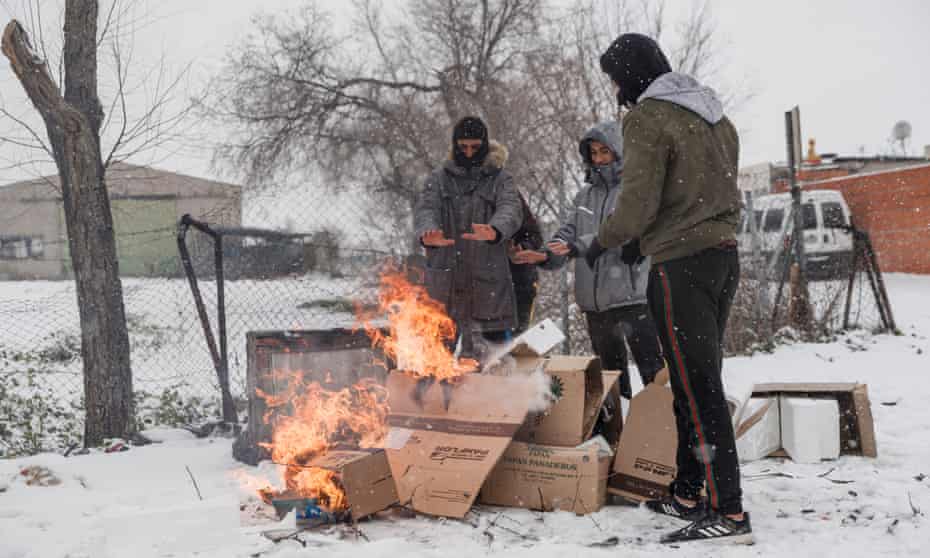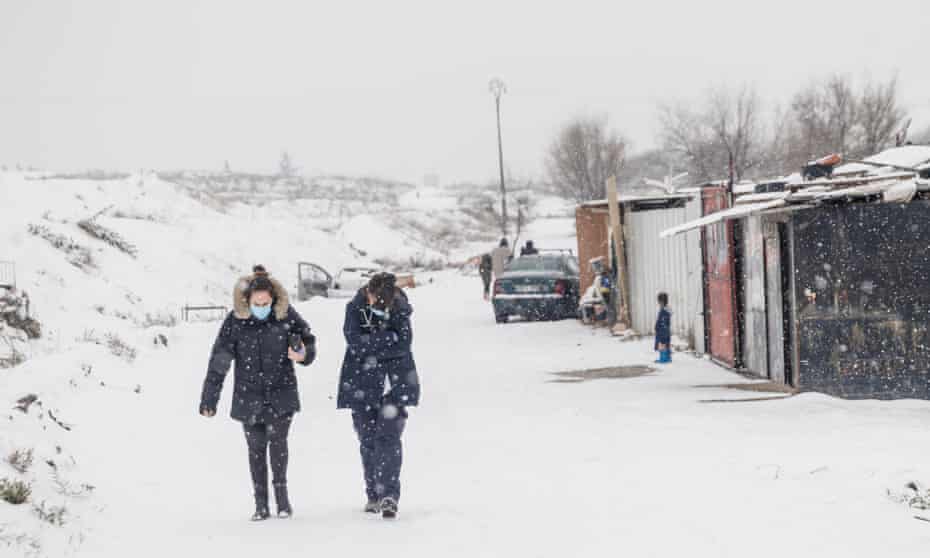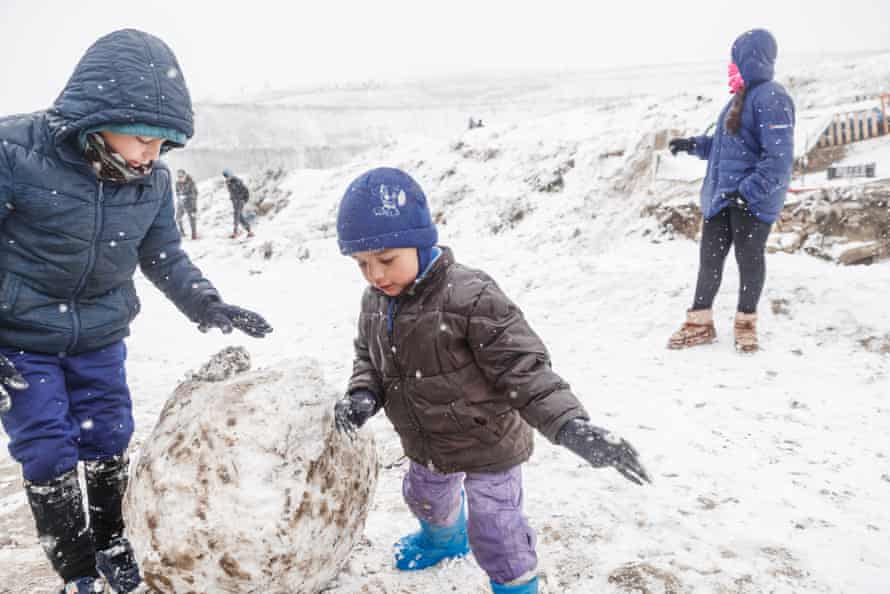No power, no water, no hope: inside Europe’s largest shanty town
Freezing weather from Storm Filomena, and Spain’s third wave of Covid, compound dire situation in settlement outside Madrid

Young people warm their hands at the Cañada Real settlement in Spain.
Photograph: Pablo Garcia/The Guardian
by Sam Jones in Madrid
Fri 15 Jan 2021 THE GUARDIAN
Despite the daily trials her family has to endure – a pandemic, three months with no electricity and now days without running water since Storm Filomena froze the pipes and left Madrid under a lingering duvet of snow – Sara Benayad has not forgotten the importance of hospitality.
She would welcome the powers-that-be to join her in the novel ritual into which the absence of water has forced her. Every night before bed, Benayad fills saucepans and buckets with snow that must be melted on the gas stove the next morning so there is water for washing and for the dishes.
“I’d really like anyone who’s responsible for this to come and spend the night with us,” she says. “We’d be honoured to have them. They can sleep in my house and suffer and live what we’re living. Maybe then they’d do something.”
Filomena has brought Madrid’s heaviest snows in 50 years, claimed four lives, torn the limbs off tens of thousands of trees and managed the rare feat of leaving the capital in a state of icy, suspended animation.
But no part of Spain has been hit quite as mercilessly as the Cañada Real, the shanty town 12km from the centre of Madrid that is home to Benayad and 8,500 other people, most of them of Moroccan or Roma descent.
by Sam Jones in Madrid
Fri 15 Jan 2021 THE GUARDIAN
Despite the daily trials her family has to endure – a pandemic, three months with no electricity and now days without running water since Storm Filomena froze the pipes and left Madrid under a lingering duvet of snow – Sara Benayad has not forgotten the importance of hospitality.
She would welcome the powers-that-be to join her in the novel ritual into which the absence of water has forced her. Every night before bed, Benayad fills saucepans and buckets with snow that must be melted on the gas stove the next morning so there is water for washing and for the dishes.
“I’d really like anyone who’s responsible for this to come and spend the night with us,” she says. “We’d be honoured to have them. They can sleep in my house and suffer and live what we’re living. Maybe then they’d do something.”
Filomena has brought Madrid’s heaviest snows in 50 years, claimed four lives, torn the limbs off tens of thousands of trees and managed the rare feat of leaving the capital in a state of icy, suspended animation.
But no part of Spain has been hit quite as mercilessly as the Cañada Real, the shanty town 12km from the centre of Madrid that is home to Benayad and 8,500 other people, most of them of Moroccan or Roma descent.

Aisha prefers to be in the snow than indoors because it is less cold when she is constantly on the move playing with the children.
Photograph: Pablo Garcia/The Guardian
Since the beginning of October, the 4,500 people who live in Sectors 5 and 6 of Europe’s largest informal settlement have been without power. The electricity provider, Naturgy, says it has never cut off the supply to the Cañada Real and blames the outages on huge surges in the two sectors that mean the network is forced to shut down for safety reasons.
It says there are only four registered users in the two sectors – despite there being some 1,500 houses in the area – adding that it has continued to provide electricity “despite the serious economic damages” caused by people illegally tapping the supply.
The regional government of Madrid says the surges are due to marijuana plantations in the shanty town that have been hooked up to the supply and are drawing so much power that the system trips time and time again.
The people of Sectors 5 and 6 dispute the claims but say they are beside the point. The lack of electricity, they say, is putting their lives – and the lives of 1,800 children in the area – in grave danger. If the situation was desperate before, Filomena has brought the Cañada Real to the brink.
“We’ve had lots of difficult times here,” says Beatriz Aragón, a doctor who has worked in the town since 2007. “We’ve had loads of fires and floods but they happened and then they stopped. And we’ve had winter power cuts before. But we’ve never seen anything like this.”
The death of a 74-year-old man who lived in Sector 6 has led to a legal complaint against the authorities, while Aragón says between 40 and 50 people have suffered from carbon monoxide poisoning because of the butane heaters used by those who can afford them.
“We’re seeing children with chilblains because their hands have been destroyed by the cold, and respiratory infections,” says the doctor.
“But the most worrying thing is how all this will play out with the third wave of Covid. One family told me yesterday they had no way to keep warm so they all shared a bed with their daughter, who’s got a fever. ‘If we don’t do that, we’ll freeze,’ they said. Having this in the middle of a pandemic is just a perfect storm.”
Aragón and her colleagues have been advising mothers and babies who can stay with relatives elsewhere to leave the Cañada Real until the temperature begins to rise. “It’s not what you want to do during a pandemic, but you’ve got to choose between what’s bad and what would be worse.”
Aura Morales, who works for the socio-educational Barró Association, is equally blunt in her assessment of the damage that is being done to the town’s younger residents. “Everything gets worse if you don’t have electricity,” she says. “Some of the kids are doing their homework inside cold cars so they can see what they’re doing.”
Other children use their parents’ mobiles to try to keep up with their lessons while schools in the region remain closed because of the snow. The phones serve a dual purpose: once lessons have been downloaded, the built-in torches are used so children can see what they’re writing after the sun goes down.
Loubna El Azmani, a community worker who lives with her family in Sector 6, says the people of the town are doing everything they can to explain their desperate circumstances to the outside world.
“We’ve demonstrated and written letters and reported the situation to the authorities,” she says. “Everybody knows what’s going on here but nobody wants to react. But they need to before there’s an ever greater tragedy here.”
Towards the end of December, a group of UN special rapporteurs called on the Spanish government to ensure that the power was restored immediately, warning: “The lack of electricity not only violates these children’s right to adequate housing, it is having a very serious effect on their rights to health, food, water, sanitation and education.”
Since the beginning of October, the 4,500 people who live in Sectors 5 and 6 of Europe’s largest informal settlement have been without power. The electricity provider, Naturgy, says it has never cut off the supply to the Cañada Real and blames the outages on huge surges in the two sectors that mean the network is forced to shut down for safety reasons.
It says there are only four registered users in the two sectors – despite there being some 1,500 houses in the area – adding that it has continued to provide electricity “despite the serious economic damages” caused by people illegally tapping the supply.
The regional government of Madrid says the surges are due to marijuana plantations in the shanty town that have been hooked up to the supply and are drawing so much power that the system trips time and time again.
The people of Sectors 5 and 6 dispute the claims but say they are beside the point. The lack of electricity, they say, is putting their lives – and the lives of 1,800 children in the area – in grave danger. If the situation was desperate before, Filomena has brought the Cañada Real to the brink.
“We’ve had lots of difficult times here,” says Beatriz Aragón, a doctor who has worked in the town since 2007. “We’ve had loads of fires and floods but they happened and then they stopped. And we’ve had winter power cuts before. But we’ve never seen anything like this.”
The death of a 74-year-old man who lived in Sector 6 has led to a legal complaint against the authorities, while Aragón says between 40 and 50 people have suffered from carbon monoxide poisoning because of the butane heaters used by those who can afford them.
“We’re seeing children with chilblains because their hands have been destroyed by the cold, and respiratory infections,” says the doctor.
“But the most worrying thing is how all this will play out with the third wave of Covid. One family told me yesterday they had no way to keep warm so they all shared a bed with their daughter, who’s got a fever. ‘If we don’t do that, we’ll freeze,’ they said. Having this in the middle of a pandemic is just a perfect storm.”
Aragón and her colleagues have been advising mothers and babies who can stay with relatives elsewhere to leave the Cañada Real until the temperature begins to rise. “It’s not what you want to do during a pandemic, but you’ve got to choose between what’s bad and what would be worse.”
Aura Morales, who works for the socio-educational Barró Association, is equally blunt in her assessment of the damage that is being done to the town’s younger residents. “Everything gets worse if you don’t have electricity,” she says. “Some of the kids are doing their homework inside cold cars so they can see what they’re doing.”
Other children use their parents’ mobiles to try to keep up with their lessons while schools in the region remain closed because of the snow. The phones serve a dual purpose: once lessons have been downloaded, the built-in torches are used so children can see what they’re writing after the sun goes down.
Loubna El Azmani, a community worker who lives with her family in Sector 6, says the people of the town are doing everything they can to explain their desperate circumstances to the outside world.
“We’ve demonstrated and written letters and reported the situation to the authorities,” she says. “Everybody knows what’s going on here but nobody wants to react. But they need to before there’s an ever greater tragedy here.”
Towards the end of December, a group of UN special rapporteurs called on the Spanish government to ensure that the power was restored immediately, warning: “The lack of electricity not only violates these children’s right to adequate housing, it is having a very serious effect on their rights to health, food, water, sanitation and education.”

A nurse and a doctor walk through La Cañada Real after visiting a child suffering hypothermia in one of the houses.
Photograph: Pablo Garcia/The Guardian
The problem, however, is that responsibility for the Cañada Real is shared between three local town halls (including Madrid city hall), the government of the Madrid region, and the central government’s delegate to the region.
Between the drip-drip of the slowly thawing ice, locals swear they can just make out the sound of the buck being passed once again.
Almost four years after a deal was signed to rehouse hundreds of families, 130 have been rehomed by the regional government and Madrid city hall.
It is, as a spokesman for the regional government points out, a gradual process. “The idea is to spread families out across the region so that you don’t end up with more ghettos,” he says. “It’s very complicated – it’s not like buying cars and sticking them in a garage; it’s about finding homes for people.”
In the meantime, the city and regional governments have been offering residents emergency shelter and butane canisters to see them through Filomena and its aftermath. According to Madrid city hall, of the 17 families identified as being especially vulnerable, only two took up the offer of moving to a shelter.
Some residents say they have turned down the offer because they are afraid of mixing with others during the Covid pandemic, and are puzzled as to why temporary accommodation is being proffered when all they want is their electricity back.

The problem, however, is that responsibility for the Cañada Real is shared between three local town halls (including Madrid city hall), the government of the Madrid region, and the central government’s delegate to the region.
Between the drip-drip of the slowly thawing ice, locals swear they can just make out the sound of the buck being passed once again.
Almost four years after a deal was signed to rehouse hundreds of families, 130 have been rehomed by the regional government and Madrid city hall.
It is, as a spokesman for the regional government points out, a gradual process. “The idea is to spread families out across the region so that you don’t end up with more ghettos,” he says. “It’s very complicated – it’s not like buying cars and sticking them in a garage; it’s about finding homes for people.”
In the meantime, the city and regional governments have been offering residents emergency shelter and butane canisters to see them through Filomena and its aftermath. According to Madrid city hall, of the 17 families identified as being especially vulnerable, only two took up the offer of moving to a shelter.
Some residents say they have turned down the offer because they are afraid of mixing with others during the Covid pandemic, and are puzzled as to why temporary accommodation is being proffered when all they want is their electricity back.

Children building a snowman. Photograph: Pablo Garcia/The Guardian
As the wait goes on, the children of the Cañada Real do what children do in the snow. The younger ones build snowmen, throw snowballs and slide down the frozen embankments on rubbish sacks. The older ones toss sheets of cardboard on to makeshift bonfires for a few seconds of flaring warmth or dash about, aware that they will be warmer rushing around outside than they would be indoors.
The town’s older residents are finding it far harder to cope with the lack of power, both literal and figurative.
“Morale has gone through the floor,” says Benayad, who gave up her job in a recycling business a month ago so she could look after her family. “This is a national disgrace – and it’s happening in a developed country in Europe in 2021.”
If the authorities are serious about getting people out of the Cañada Real, she adds, they need to offer clear solutions.
“The way things are going, the only people they’ll manage to get out of here are the dead ones.”
Additional reporting by Pablo García Sacristán
As the wait goes on, the children of the Cañada Real do what children do in the snow. The younger ones build snowmen, throw snowballs and slide down the frozen embankments on rubbish sacks. The older ones toss sheets of cardboard on to makeshift bonfires for a few seconds of flaring warmth or dash about, aware that they will be warmer rushing around outside than they would be indoors.
The town’s older residents are finding it far harder to cope with the lack of power, both literal and figurative.
“Morale has gone through the floor,” says Benayad, who gave up her job in a recycling business a month ago so she could look after her family. “This is a national disgrace – and it’s happening in a developed country in Europe in 2021.”
If the authorities are serious about getting people out of the Cañada Real, she adds, they need to offer clear solutions.
“The way things are going, the only people they’ll manage to get out of here are the dead ones.”
Additional reporting by Pablo García Sacristán
No comments:
Post a Comment